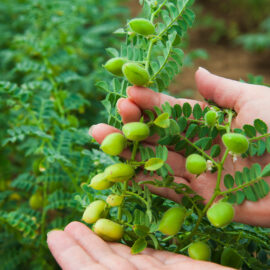Over the last few years, a mounting body of research has shown that the current process of food production and consumption are major drivers of increases in greenhouse gas emissions, land and resource use, and adverse health effects.1 This is especially alarming considering society will have to provide food security for the growing global population while shifting to healthier diets. Research examining the co-benefits of shifting to universally sustainable diets, that consider dietary needs, nutritional quality, and environmental footprints, may significantly reduce all-cause mortality and cancer risk, alongside a potential reduction in greenhouse gas emissions and land use.2
While the term “sustainability” has become popular in media and academic circles, confusion remains about what a sustainable diet includes. As a result of this lack of understanding, coupled with ongoing misinformation in media, making environmentally friendly food choices can be challenging. According to a survey by Mckinsey & Company, almost 50 percent of consumers find it difficult to understand what they need to do when it comes to choices on health and sustainability.3 The global rise in food prices has also served as a barrier for those that aren’t equipped with the knowledge on how to shop, meal plan and eat on a budget or may not realize how cost-effective sustainable diets can be. Research aiming to evaluate the costs of environmentally-conscious diets has found them to be substantially less costly (up to 25-29% less) than western diets, which was also subject to factors such as reductions in food waste.4
As consumers struggle to adopt healthier and more sustainable eating habits that are easy on the wallet, healthcare professionals are well-positioned to help their patients shift daily food decisions to become drivers of change.
What is a Sustainable Diet?
While many people may think of sustainable eating as simply being able to maintain for the long-term, sustainable diets, that positively impact both health and the environment, are more complex. According to the Food and Agricultural Organization of the United Nations (FAO), the sustainability of diets goes beyond nutrition and environment and includes economic and socio-cultural dimensions.5 Recommendations that promote sustainable food practices include eating a plant-based diet, focusing on local and seasonal foods, reducing food waste, reducing red meat consumption and that of other animal products, and limiting processed foods and sweetened beverages.
Eating Sustainably on a Budget – Helping Patients Get Started
The amount of information and guidance on how to eat sustainable for human and planetary health can be overwhelming, leaving consumers unsure of where to start, especially when cost is a concern. However, for dietary changes to take place, misconceptions about sustainable diets should be eliminated through education.6 While rising foods costs are top of mind, there are a few ways to consume a diet that is both good for the body and planet. According to research, 74 percent of consumers are changing their shopping behaviors to get more for their money, including buying in bulk. With this rise in interest, healthcare professionals could provide education on the bulk items, like beans, that are affordable and fit into a sustainable diet.3 According to Orgain Nutrition Advisory Board member, Alison Tierney, MS, RD, CSO, “many plant-based proteins, such as beans and lentils, are a budget friendly option full of protein, fiber, iron, phytonutrients, and other healthful nutrients.” She suggests swapping beans or lentils – either dried or canned – for meat in tacos or other dishes that would typically use meat (e.g., pasta bolognese, Shepard’s pie, etc.). Plant-based meat alternatives are on the rise but can be expensive and may not always offer the highest quality nutrition. For this, Tierney says, “stick with sources of whole, plant protein options such as beans, lentils, tofu, and whole grains to drive your grocery bill down.”
Beyond the myriad of health benefits, incorporating more plant-based foods is an easy way to help reduce the environmental footprint and support population health. Tierney says, “Per WHO’s Sustainable Healthy Diets: Guiding Principles, animal sourced foods have higher environmental impacts per calorie of food than most plant-based foods as these food systems require higher amounts of natural resources such as water and land and increase residual emissions into the environment. Thus, reducing our consumption of animal foods has been widely considered to be one of the most effective ways to reduce our environmental impact, on an individual level.”
Pre-planning and preparing meals for the week is a great way to stay within budget, be more mindful of meals that repurpose ingredients, and helps to take the guesswork out of what to make daily. Tierney adds that “creating a meal plan and grocery list prior to heading to the grocery store can save money, waste less food, and reduce the stress of deciding what’s for dinner.”
Here are some more budget-friendly nutrition tips for patient education from members of the Orgain Nutrition Advisory Board:
Kelly Jones, MS, RD, CSSD, LDN
- Seek Budget-Friendly Plant Proteins: “One of my top tips to eat sustainably on a budget is to incorporate more plant proteins. Plant proteins may utilize less water for growth and are less likely than meat to contribute to excess deforestation. While prepping beans from dry is an option, most people are low on time with busy, active schedules. For this reason, canned beans top my list. They are a convenient source of protein, fiber, b-vitamins minerals and more. Since they’ll last so long in your pantry, the chance of spoilage is greatly reduced, and cans are infinitely recyclable. For those with heart health concerns or low activity levels, look for low or no sodium canned bean options.
- Use Your Freezer: “Instead of waiting for produce to go bad and throwing it out (or not buying it at all in fear of uncovering rotting produce in the back of your fridge), freeze your leftover fruits, vegetables, and herbs. Less food waste is better for the environment and our bank accounts. Plus, eating more plants is better for our health. Win, win, win.”
Kim Rose, RDN, CDCES, CNSC, LD
- Try Growing a Garden: “Growing your own produce is a rewarding way to have fresh produce at your fingertips. Even if you don’t have the space to plant a tree, consider growing tomatoes, peppers, or fresh herbs in a pot that can be placed on your patio or balcony.”
- Reuse Your Food Waste: “Think twice before tossing your food scraps. Throwing away food not only means you’re throwing away money, but it increases greenhouse gases. Instead of throwing away your waste, consider using your food scraps as compost for your garden.”
- Buy in Bulk & Always Recycle: “The packaging food comes in can significantly impact the environment and our wallets. To reduce this impact, first, consider buying in bulk. Buying in bulk is almost always more cost-effective. Second, when purchasing bulk items, look for products made from recyclable materials. This helps to reduce waste and decrease your carbon footprint.”
To further your learning about ways to invest in the planet through sustainable practices, check out the below resources from our expansive library of science-based briefs and podcast episodes.
Science-Based Briefs
The Good Clean Nutrition Podcast
![]()
- Ritchie, H., Rosado, P., & Roser, M. (2022, December 2). Environmental impacts of food production. Our World in Data. Retrieved March 25, 2023, from https://ourworldindata.org/environmental-impacts-of-food
- Laine, J. E., & Huybrechts, I. (2021). Co-benefits from sustainable dietary shifts for population and environmental health: An assessment from a large European cohort study. The Lancet Planetary Health, 5(11). https://doi.org/10.1016/s2542-5196(21)00250-3
- Grimmelt, A., Moulton, J., Pandya, C., & Snezhkova, N. (2022, October 5). Hungry and confused: The winding road to conscious eating. McKinsey & Company. Retrieved March 25, 2023, from https://www.mckinsey.com/industries/consumer-packaged-goods/our-insights/hungry-and-confused-the-winding-road-to-conscious-eating
- Springmann, M., Clark, M. A., Rayner, M., et al. (2021). The global and regional costs of healthy and sustainable dietary patterns: A modelling study. The Lancet Planetary Health, 5(11). https://doi.org/10.1016/s2542-5196(21)00251-5
- Dietary guidelines and Sustainability. Food and Agriculture Organization of the United Nations. (n.d.). Retrieved March 25, 2023, from https://www.fao.org/nutrition/education/food-dietary-guidelines/background/sustainable-dietary-guidelines/en/
- Morren, M., Mol, J. M., Blasch, J. E., & Malek, Ž., et al. (2021). Changing diets – testing the impact of knowledge and information nudges on sustainable dietary choices. Journal of Environmental Psychology, 75, 101610. https://doi.org/10.1016/j.jenvp.2021.101610



